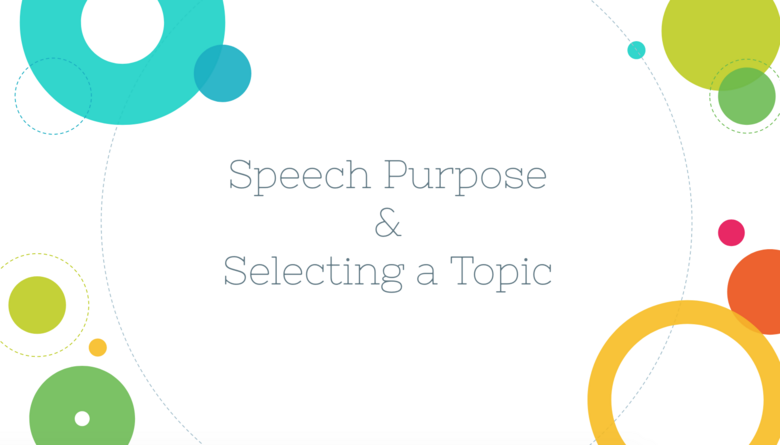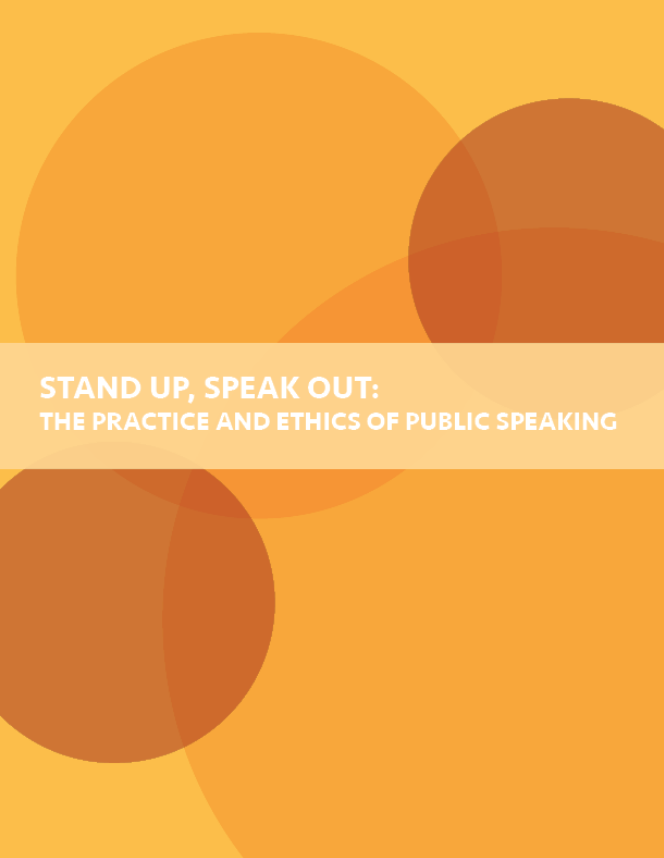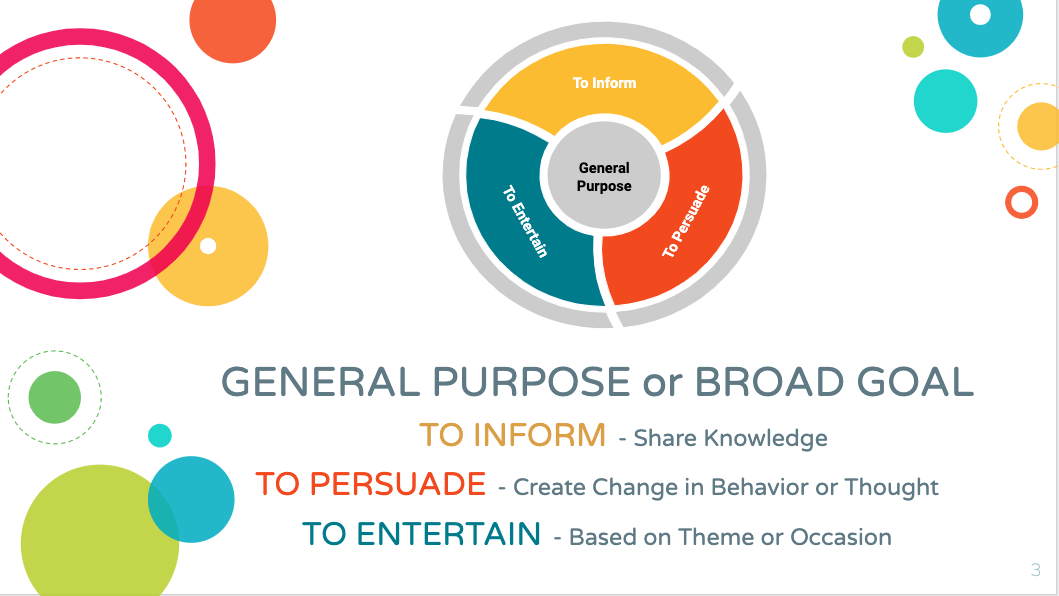- Subject:
- Communication, Public Relations, Speaking and Listening
- Material Type:
- Module
- Provider:
- Ohio Open Ed Collaborative
- Tags:
- License:
- Creative Commons Attribution Non-Commercial
- Language:
- English
- Media Formats:
- eBook
Education Standards
News Website - BBC
News Website - CBS News
News Website - CNN
News Website - Fox News
News Website - MSN News
News Website - NBC News
News Website - NPR
Text - “Preparing a Speech” “Brainstorming”,
text - “Preparing a Speech”, chapter 9 from the book A Primer on Communication Studies (v. 1.0).
Video - Brainstorm your Research Topic
Video - Choosing and Narrowing a Topic
Video - How to Develop a Good Research Topic
Video - Picking a Topic
Video - Picking Your Topic IS Research!
Video - Speech Purpose & Central Idea
Video - Topic Selection Sometimes the hardest part of public speaking
website - Brainstorming
website - Polling Report
website - Rasmussen Reports
website - The Gallup Organization
website - US Census Bureau
Speech Purpose & Selecting a Topic

Overview
What to speak about? How to find a topic? Does the topic have the appropriate scope? Being stuck, not knowing what to talk about? How to move from general purpose to specific purpose and a thesis statement? These are key questions speakers must answer as they prepare for a presentation. First, determining general purpose: Is the goal to inform, to persuade or to entertain. Next, the section discusses how to broaden the topic or narrow the topic down to meet speaking constraints. Finally, it suggests tools to help to come up with topic ideas for topics. Once a topic is selected, the speaker must determine their specific purpose and central idea.
Learning Objectives
- Explain the differences between the three general purposes of a speech.
- To Inform
- To Persuade
- To Entertain
- Demonstrate finding and selecting an appropriate topic.
- Illustrate how to focus your topic.
- Identify tools to help find a topic.
- Develop and define general purpose, specific purpose, and central idea/thesis.
(This Module meets the TAG/OCM 013 for a Public Speaking Course; Learning Outcome 8)
Recommended Textbook Resources
Stand up, Speak out: The Practice and Ethics of Public Speaking
Stand up, Speak out: The Practice and Ethics of Public Speaking
Supplemental Content/Alternative Resources
Video Resources:
Speech Purpose & Central Idea This video discusses the process of developing a general purpose statement, specific purpose statement, and central idea statement for a speech. COMMpadres Media Published on Aug 16, 2016. Category Education, License Creative Commons Attribution license (reuse allowed)
Choosing and Narrowing a Topic - Learn how to use the library's databases to choose a topic and then narrow it using concept maps or brainstorming techniques. Sccclibrary Published on Apr 26, 2013. Category Education, License Creative Commons Attribution license (reuse allowed)
Topic Selection Sometimes the hardest part of public speaking is figuring out what to talk about. This video discusses the criteria that make a solid speech topic and provides some basic tips on generating ideas for speech topics. COMMpadres Media Published on Aug 16, 2016. Category Education, License Creative Commons Attribution license (reuse allowed)
How to Brainstorm Alone Brainstorming is a process of creating and fleshing out ideas so that you can create new concepts, solve problems, and increase productivity. While you can brainstorm in groups, sometimes you will have to come up with ideas on your own. How To DIY Published on Sep 21, 2018. Category Howto & Style, License Creative Commons Attribution license (reuse allowed)
Picking a Topic - Strategies for choosing a topic and making sure it's workable. Laurier Library Published on Oct 8, 2013. Category Education, License Creative Commons Attribution license (reuse allowed)
How to Develop a Good Research Topic -- In this video, you will learn how to develop a good research topic. Although this video refers to research papers the same principles apply to “Finding a Good Speech Topic." KStateLibraries Published on Aug 20, 2013. Category Education, LicenseCreative Commons Attribution license (reuse allowed)
Brainstorm your Research Topic -- How to come up with an effective and manageable research paper topic. Although this video refers to research paper topics the same principles apply to brainstorming speech topics. Esclibrarian Published on May 12, 2015. Category Education, License Creative Commons Attribution license (reuse allowed)
Picking Your Topic IS Research! When you pick your topic, it's not set in stone. Picking and adjusting your topic is an integral part of the research process! Although this video refers to research topics the same principles apply to speech topics. Libncsu Published on May 1, 2014. Category Education, This video is published under a Creative Commons 3.0 BY-NC-SA US license.
Text Resource:
Brainstorming Handout This is “Preparing a Speech” “Brainstorming”, chapter 9 from the book A Primer on Communication Studies (v. 1.0). The Writing Center, University of North Carolina at Chapel Hill
PowerPoint Slides
Topic Application Section
Finding a Topic: Exercise, Homework or Class Discussion
(25-45 minutes depending on length of class discussion)
| Name | Website |
| The Gallup Organization | http://www.gallup.com/ |
| US Census Bureau | http://www.census.gov/ |
| Polling Report | http://www.pollingreport.com/ |
| Rasmussen Reports | http://www.rasmussenreports.com/ |
| Zogby International | http://www.zogby.com/ |
| Pew Research Center | http://pewresearch.org/ |
Using one of the above Polling Organizations that were suggested in your reading. Choose 2-3 topics that might be of interest to your public speaking class for a ___________minute informative/persuasive presentation. How do these topics adhere to the four constraints of topic selection: Purpose, Audience, Context and Time Frame that were discussed. How might the presentation differ if the constraints change?
Moving from General Purpose to Specific Purpose to Central Idea: Exercise, Homework or Class Discussion
(25-45 minutes depending on length of class discussion)
As a large group review these examples for “A Primer on Communication Studies”.
- Topic: My Craziest Adventure
General purpose: To Entertain
Specific purpose: By the end of my speech, the audience will appreciate the lasting memories that result from an eighteen-year-old visiting New Orleans for the first time.
Thesis statement: New Orleans offers young tourists many opportunities for fun and excitement. - Topic: Renewable Energy
General purpose: To Inform
Specific purpose: By the end of my speech, the audience will be able to explain the basics of using biomass as fuel.
Thesis statement: Biomass is a renewable resource that releases gases that can be used for fuel. - Topic: Privacy Rights
General purpose: To Persuade
Specific purpose: By the end of my speech, my audience will believe that parents should not be able to use tracking devices to monitor their teenage child’s activities.
Thesis statement: I believe that it is a violation of a child’s privacy to be electronically monitored by his or her parents.
“Preparing a Speech”, chapter 9 from the book A Primer on Communication Studies (v. 1.0).
Break the students into groups (3 to 4 participants) ask them to choose a topic and prepare a 1-2 min presentation/speech on a topic of their choosing. Ask the remainder of the class to identify the following:
Topic: |
|
General Purpose: |
|
Specific Purpose: |
|
Central Idea or Thesis Statement: |
|
Review how the presentation meets the needs of the intended audience and the rhetorical situation. Was it clear, precise and appropriate for the time limit?
End of Section Review
Topic Summary
This section focuses on the importance of determining your general purpose. Is the objective of your presentation to inform, to persuade or to entertain. Next, this section will give you suggestions on how to find a topic, then broaden or narrow that topic so it meets the four primary constraints of topic selection. Finally, this section explores how to move from your general purpose to your specific purpose and your central idea.
Glossary of key terms/concepts
- General Purpose
- To Inform
- To Persuade
- To Entertain
- Types of Informative Speech Topics
- Objects
- People
- Events
- Concepts
- Processes
- Issues
- Pure Persuasion
- Manipulative Persuasion
- Behavior
- Attitudes
- Values
- Beliefs
- Core Beliefs
- Dispositional Beliefs
- Personal Inventory
- Specific Purpose
- Central Idea / Thesis
Review questions
- Why is knowing your general Purpose important?
- Describe the difference between an informative, persuasive and a speech to entertain.
- Define and distinguish between Behaviors, Attitudes, Values and Beliefs.
- Why is rhetorical situation important when determining a topic?
- How does you general purpose, specific purpose and central idea differ? What is consistent? Is one more important than the others?
Discussion questions.
- You are giving a speech on “Dangers of Smoking Cigarettes.” What is the General Purpose? Defend your answer.
- You’re giving a presentation on “Whales” What about whales might you talk about if your informative speech focuses on objects, people, events, concepts, processes or issues.
- What is the difference between “pure persuasion” and “manipulative persuasion”. Are they both ethical?
- When do you give a presentation to entertain? Are they important? Are they always funny?
